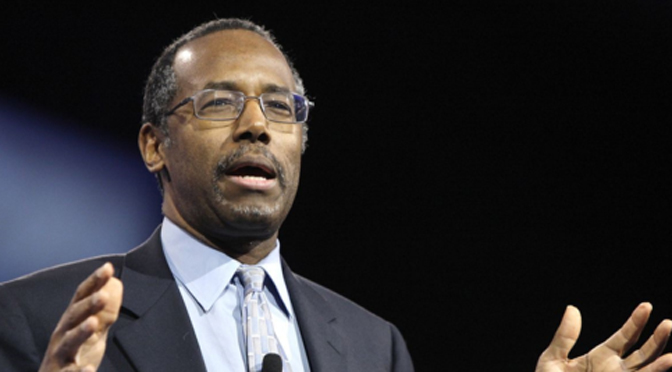Days after shocking pro-lifers by saying the Terri Schiavo case was “much ado about nothing” and that Congress shouldn’t have gotten involved, retired neurosurgeon and GOP presidential hopeful Dr. Ben Carson has walked back those remarks, claiming he was criticizing the “media circus” the situation was “turned into” rather than pro-lifers’ intervention…
“I regret that my recent comments about Terri Schiavo have been taken out of context and misinterpreted,” he continued.
“When I used the term ‘much ado about nothing,’ my point was that the media tried to create the impression that the pro-life community was nutty and going way overboard with the support of the patient,” Dr. Carson told LifeSiteNews.
He added that his off-the-cuff remarks to a reporter from the Tampa Bay Times were about allowing terminally ill patients to refuse heroic treatments, not about giving food and water to someone diagnosed in a persistent vegetative state (PVS).
At first glance, this would seem to be in line with those who’ve urged a more charitable interpretation of Carson’s words, such as Tom Trinko at American Thinker who argues it was “obvious that Carson is not endorsing killing an otherwise healthy Schiavo by dehydration” but was rather “confused about the facts of the case and seems to think that Schiavo died due to complications from her condition.”
However, Terri’s brother Bobby Schindler as well as other pro-life leaders aren’t totally sold on his clarification. Schindler called the “idea that family and physician consensus alone should decide the fate of those like my sister” “problematic,” declaring that “starving and dehydrating someone to death is always wrong, whatever the beliefs of physicians or family members,” though he opened the door to “the opportunity to speak privately with Dr. Carson to share our perspective in good faith.”
And Operation Rescue’s Cheryl Sullenger said she was “not completely convinced that his explanation isn’t just an attempt at damage control,” and is “concerned that he made his original comments while appearing not to completely understanding the fact that Terri was brain damaged, but not terminally ill.”
Both charity toward Carson’s intentions and skepticism over his judgment are warranted in this case. He is certainly a passionate pro-lifer who’s been candid about his evolving thinking on the issue since long before his presidential run, so there is no reason to doubt his professed opposition to euthanasia.
At the same time, though, his follow-up fails to fully address the reasons his original comments were so controversial. As originally reported in the Washington Post (and if the question really was something different from “whether Carson thought it was necessary for Congress to intervene,” Carson hasn’t said so), he did suggest things didn’t need to “get to that level” and were “much ado about nothing.” That strongly suggests he didn’t know or recall that Congress only got involved because Michael Schiavo’s claims to be carrying out Terri’s wishes were uncorroborated and highly suspicious.
Second, his medical explanation that “you have to recognize that” fatal complications happen and that the job of doctors is “not to treat everything that comes up” only make sense in the context of whether someone dying on her own should be kept alive through extraordinary means. They simply aren’t applicable to a discussion of whether to starve an incapacitated woman who needs only a feeding tube to survive.
What seems to have originally happened here isn’t the worst thing in the world—Ben Carson botched a question because he misremembered the facts of a ten-year-old controversy. There’s no great shame in a non-policymaker having not paid close attention to the news back then, and it of course doesn’t mean he isn’t pro-life.
A response that simply admitted to being misinformed and affirmed that the government should step in whenever an American’s right to life is threatened would have ended it—in fact, it would have fit perfectly with the candor and humility that his non-politician candidacy is based on.
Instead, Carson followed bad advice to take the conventional politician’s route of blaming the confusion on others “misinterpreting” and taking it “out of context,” and awkwardly trying to parse the same words into a different meaning—diluting the difference between him and the rest of the Republican field and renewing questions as to just how ready he is to take on this fight.







